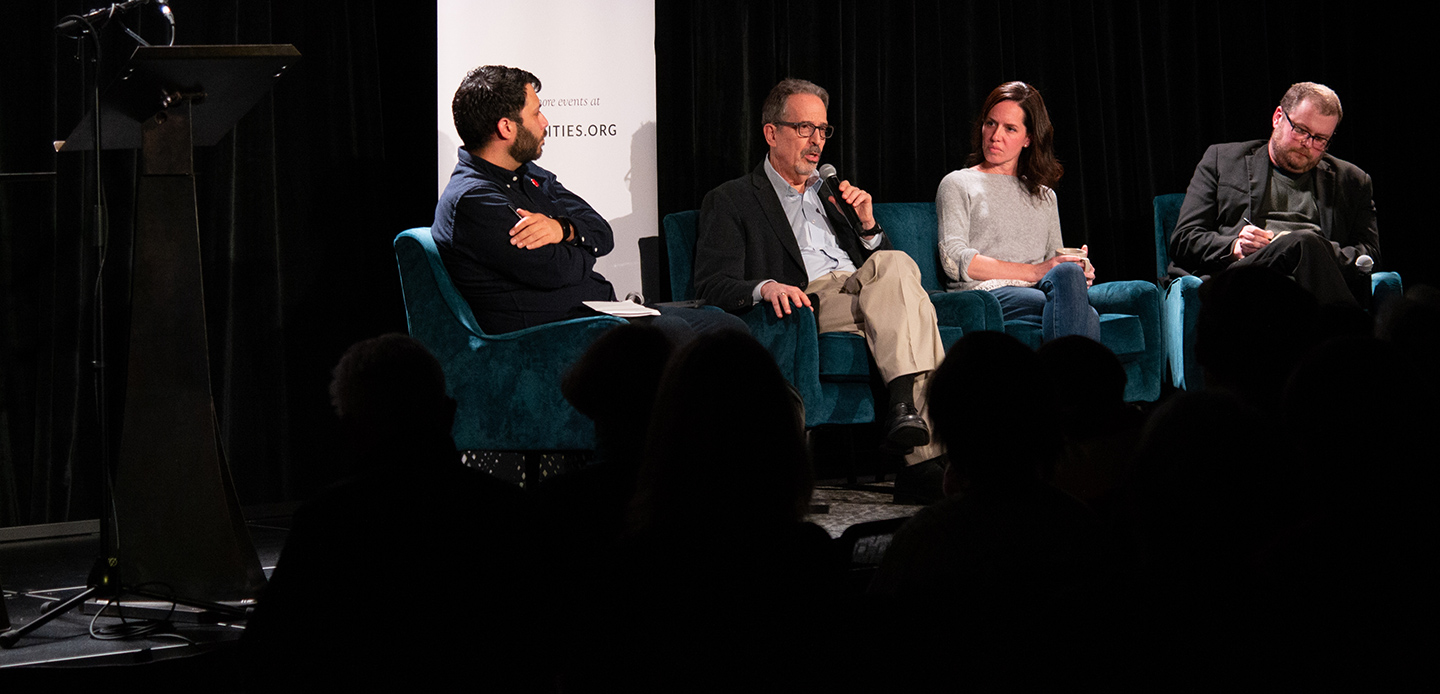“Is the internet making us miserable?” A panel of three scholars — two from the University of Washington Information School and one from the Seattle University Philosophy Department — debated that topic before a packed crowd of more than 200 at Town Hall Seattle on Feb. 12.
Moderator Paul Franco, a UW Philosophy lecturer, opened with the night’s key question about misery. All of the panelists agreed that the internet itself isn’t solely to blame and that people’s interactions with it are a result of factors on both ends of the exchange.
“The economic incentives around technology really shape the types of experiences that people have,” said Alexis Hiniker, an assistant professor at the iSchool. She noted that many problems arise because websites are chasing metrics around capturing people’s attention for as long as possible.
iSchool Professor David Levy, whose work includes “Mindful Tech,” a book on bringing contemplative practices into people’s digital lives, concurred that the internet’s greatest flaw was its constant need for attention.
“Part of what I find makes me deeply unhappy as an academic and as a person,” Levy said, “is the feeling that I have no time to think, that I have no time to breathe, that I have no time to live an inquiring life because it seems like at least the world that I live in … it feels that I’m always on the clock.”
Joshua Johnston, the Seattle University philosopher, said the burden is on us if the internet is making us unhappy.
“We need to change how we engage with the internet,” he said. “If the internet is making us miserable, let’s have some say in our interaction with the internet.”
“I come out of Silicon Valley, but I don’t think the tech industry can be trusted to regulate itself.”
The panel was part of Humanities Washington’s “Think & Drink” series, a set of conversations held across the state throughout the year. A follow-up event on the same topic, featuring Levy and iSchool Dean Anind Dey, is scheduled for April 21 in Tacoma. This pair of events is part of a three-topic series featuring the iSchool, focused on data and society. The next pair of events will be in April and May on the topic of data, privacy and security.
A recurring theme from the Feb. 12 panel, which was co-sponsored by Town Hall Seattle and the iSchool, was that if things on the internet are making us miserable, they are a result of design decisions, not an inevitable state of being. That’s a theme on which Hiniker has focused in her research at the iSchool, where she studies the downsides of technology with the hope that future industry workers will keep them in mind when designing products.
“None of these things exist in a vacuum,” Hiniker said, citing her recent study of young children that measured how much influence features such as auto-play exert over them. “If we want to support kids in engaging in less excessive media use, we don’t need to design to police it, we just need to stop designing to encourage it.”
Franco, the moderator, prompted the panel for solutions, asking whether the burden to make people less miserable on the internet is on developers or users, or whether government intervention is warranted.
Levy made the case for legislation of the tech industry, noting that Facebook has decided not to monitor the truthfulness of political ads despite their use in disinformation campaigns in the 2016 presidential election.
“I come out of Silicon Valley, but I don’t think the tech industry can be trusted to regulate itself,” he said. “On the other hand, do we really trust politicians? We have a really hard problem here.”
Hiniker noted the power that designers have accumulated and the fact that they can even influence the course of democracy — something that very few of them expected or trained for. “They’re so unprepared and perhaps not even interested in having that responsibility,” she said.
Johnston echoed Hiniker in pointing to the need for ethical training for software developers.
“Get some ethicists into the development of programs,” he said. “There are ethical choices in design. How are they designing what they’re doing?”
At the end of the night, Johnston challenged everyone in the audience to see if they could take the entire next day away from their phones and see how that changed their perspective. Many in the audience groaned and shifted uncomfortably. It seemed unlikely that many would be able to complete the mission.
Listen to a podcast of the event:
Pictured at top, from left: Paul Franco, David Levy, Alexis Hiniker and Joshua Johnston at Town Hall Seattle on Feb. 12. Photo by Doug Parry.
